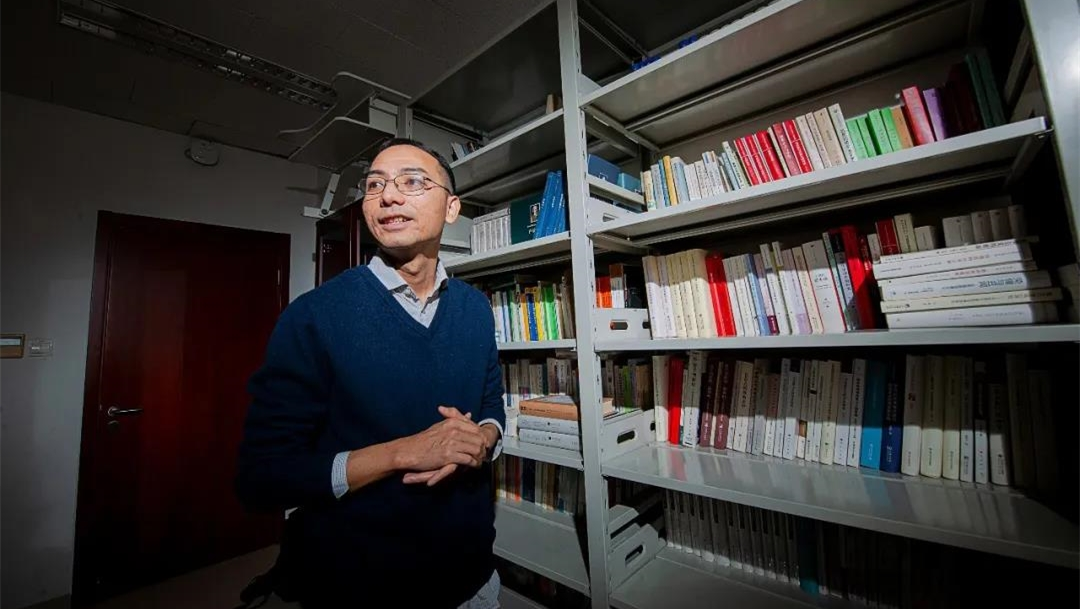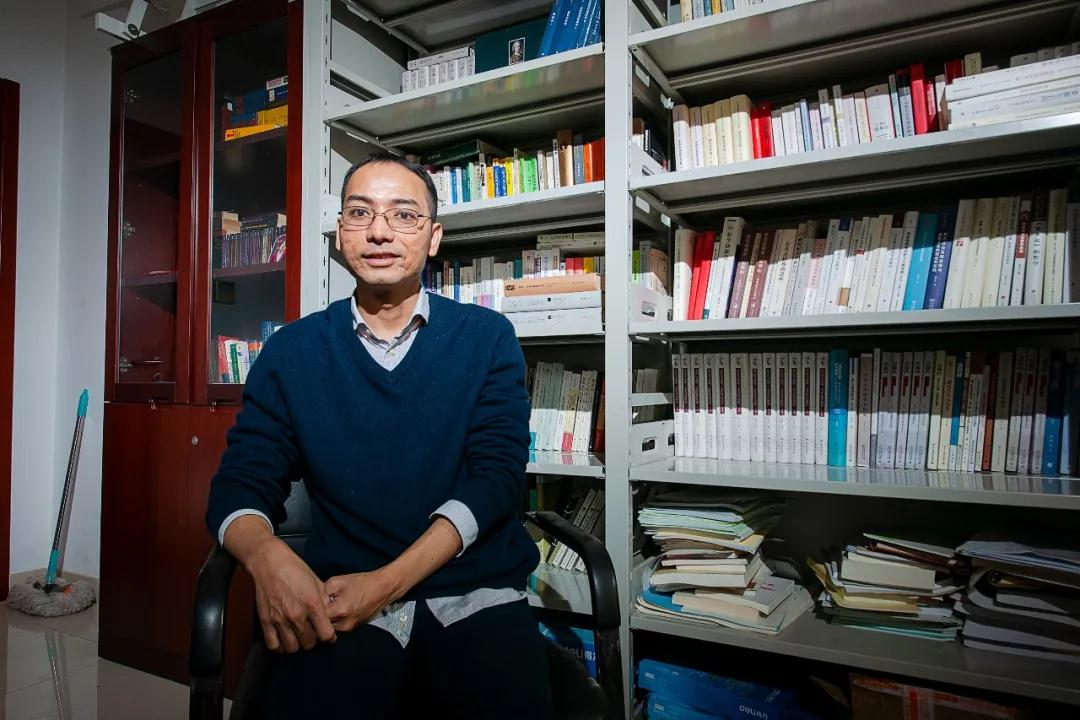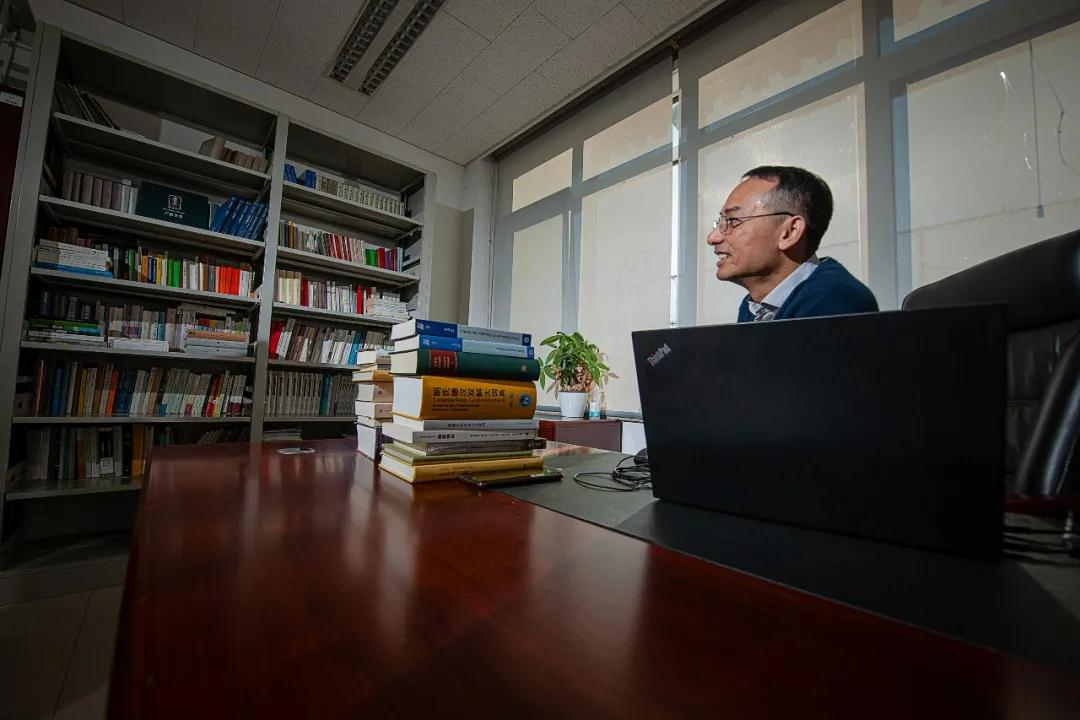Peking University, March 30, 2021: Hidden among the beautiful and traditional architecture of Peking University lies humble-looking corners filled with precious and pleasant riches of knowledge, enveloped with row after row of neatly lined up books towering towards the tall ceiling.
These mysterious hidden corners of Peking University are in fact the study rooms of generations and generations of Peking University scholars and professors. Here, we invite you to explore with us various study rooms on PKU campus through the lenses of prominent PKU scholars. Embark on this journey with us and you'll be given insights into some of the most brilliant minds of PKU as you hear them share stories of their study rooms- the place where all the magic happens.

Professor Fang Bo's study is also his office in the Philosophy Department of Peking University. On a clear day, the bookshelves in his room glisten and shine under washes of sunlight streaming into the room. The tidiness is apparent – shelves neat and clean with space to breathe, a desk carrying ten or so books flipped through more often. Things feel airy and light.
Professor Fang is clear-headed when it comes to book collecting: "Having what's required is enough."
Understanding the world through action
The contents in the room are a testament to Professor Fang's time living and studying in PKU and Germany. Books arranged according to themes such as German classical philosophy, political philosophy, and literature lie on bookshelves open and enclosed. Coming first into view is a collection of books on Western philosophy by Rousseau and other authors, treasures brought back during his studies in Germany. "Disciplines in their time were not as clearly distinguished as they are nowadays, so these books are largely encyclopedic." The dense theoretical literature has aided Professor Fang in his research.

At the bottom of the bookshelf lie some non-academic books, such as the work of literary fiction "The Brothers Karamazov" by Fyodor Dostoevsky. Professor Fang had revisited the novel a while ago and emerged with a completely different take from what he'd gotten before. "Before, I'd come to the book with merely an appreciation for literature, but now, reading from a professional angle makes it much easier to deliver critique."
Near the entrance of the study, a dark wooden bookshelf holds books brought back from Germany after Professor Fang's graduation, and few books written in a foreign tongue. These English and German books, weighing an astonishing 35kg, are but few of the many Professor Fang has hauled home. The collection consists of classics of great philosophers such as Hegel, Plato and Schopenhauer, and research by modern thinkers, many of whom are Professor Fang's acquaintances. A few family portraits and a small handmade gift from his daughter in kindergarten sit quaintly on the shelf, providing a glimmer of warmth to the solemnity.
As a scholar, living and learning in the East and West has prompted Professor Fang to reflect on new problems encountered by the discipline throughout its course of development. From the ashes of the collision of different civilizations emerge new strands of thought that traverse and transcend.
Philosophy: A misunderstood discipline
For those unschooled in philosophy, the discipline seems abstract, profound, and perplexing.
"The political philosophy we study is relatively grounded because what we grapple with is quite specific. In fact, philosophy can actually be divided into different disciplines." Taking the apprehension of the layman in mind, Professor Fang gently retrieves two books from his shelf to recommend:"Midlife: A Philosophical Guide" by Kieran Setiya and "The Practice of Philosophy: Handbook for Beginners" by Jay Rosenberg. Though these are not your typical heavyweights, much can be gleaned from their simplicity. "Books like these are interesting because they address issues of concern at its roots with a philosophical approach. They ease anxiety, and are layman-friendly reads".
Many people hold misconceptions about philosophy. Although philosophy falls under the humanities, it is a highly technical and dynamic discipline. It deals with discussions on fundamental values and harbors strong humanistic concerns, but also has its foundations in logic, mathematics and other technical disciplines.
As Professor Fang sees it, philosophy moves in tandem with science and technology. "For example, in analytical philosophy, it will be better for one to have a foundation in logic and mathematics because most discussions are highly technical, sometimes involving purely symbols and formulae. When making an inference, scholars try to avoid making a proposition with natural language."
Bringing philosophy to everyone
According to Professor Fang, there are two methods the proliferation of philosophy can follow: a question-based method, and a historically-based method.
"Question-based" proliferation deals with issues of general concern and offers different philosophical solutions. For instance, when faced with the Trolley Problem, some seek ways to solve the problem while others question the way the problem has been posed. Differing interests lead to variations in approach, but the center of concentration remains the problem at hand. The different schools of philosophy can offer a host of answers to the problem, serving the interests of the masses.
"History-based" proliferation reaches into the depths of time to clarify the initial form, the process of evolution, and the direction of progress of a problem. In answering a question, we should visit the wisdom of both the greats and the contemporary thinkers. "Texts can amp up their entertainment value. For instance, 'Sophie's World', the book middle schoolers adore, is itself popularizing philosophy."
Professor Fang is the father of a five-year old and a two-year old. When asked if he would consider steering his kids in the path of philosophy, his reply is affectionate: "Let them pursue their interests. My daughter says she wants to be an astronomer." Interest too lies at the core of the force driving Professor Fang in his study of philosophy.
The study of philosophy differs from that of other disciplines in that one might arrive on the other side haunted by an unanswered question for the rest of his life. "Ultimately, philosophy may not provide you with an answer once and for all, but it can clarify your thoughts and point out your mistakes." Here, perhaps, is where the value of philosophy lies.
Knocking on the world's door
A significant portion of Professor Fang's readings consists of academic literature. Yet philosophy is an all-inclusive discipline, allowing Professor Fang to foray into psychology, literary classics and other areas of personal interest.
In his eyes, reading can be both academic and non-academic.
For students, Professor Fang suggests that laying a solid foundation while studying should be of utmost priority. Freshmen especially need to learn how to think with clarity. To this regard, academic reading might confuse rather than clarify; students of philosophy tend to get caught up in a host of different standpoints that may be hard to reconcile. That however should not be cause for panic, for through getting in touch with a range of perspectives and differing viewpoints, one can discover the splendid diversity of our world.

On the other hand, reading philosophy can be helpful for the ordinary man in settling on a position or attitude towards life. On a more general note, reading within and beyond one's academic circle opens up a broader perspective beyond their field of study, allowing readers to construct holistic, dynamic modes of thinking.
"I don't think it's absolutely necessary to read ancient classics. What's more important is understanding the way other disciplines discuss problems and identifying the focus of their discussion, their concerns and the methods they apply."
Accessing other perspectives is also a way for us to understand the world."Reading literature is important, since it affects how we get to experience the world."
Reading is our window to the world. Fictional as its contents might be, there is still much waiting to be found in between the pages.
Keeping a distance from the world
What is the world like? How should individuals live in a world devoid of meaning? Where does individual life place within the greater order of the world? Questions such as these are answered in every densely-packed-book and grappled with daily in this study.
Professor Fang sees his study as a working area where he conducts extensive reading, a communal area functioning as a private space. In a deeper sense, it is a small haven between man and world. "A study provides us with the choice to keep our distance from the world. With this, we are able to retreat from the chaos of society and view the world through a different lens."
Professor Fang's study is an intermediary between himself and his environment, helping him to see the world in a new light. In this intermediary, forged by books, classics, and the experiences and musings of others, one is washed over by a sense of calmness as he returns to examining the world.
Where the winding path leads, Professor Fang retreats behind books and the wisdom of the sages, and from a certain distance, surveys the world anew.
Photo credit to: Lv Chen
Designer: Pu Hairui